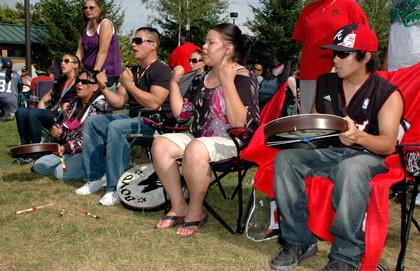TULALIP — The Battle of Nations Stick Game Tournament drew 177 teams, for an estimated 1,500 attendees, to the Tulalip Amphitheatre Aug. 20-22, as even event organizers expressed amazement at the turnout.
When asked how many Native American tribes might be represented, event organizer and Colville Tribal member Rusty Farmer laughed and said, “Your guess is as good as mine, so good luck. It’s four times the size of any other event like this.”
The stick game, in which teams perform songs and try to bluff one another in a guessing game, has remained a popular tradition for Native American tribal members throughout the summer months. The Battle of Nations at the Tulalip Amphitheatre offered a total of $100,000 in prize money, as well as free giveaways such as 800 blankets, 120 duffel bags and 300 coolers.
“It’s about bringing back our cultural heritage,” said Marlin Fryberg Jr., Tulalip Tribal Board vice chair. “During the recent canoe journey, our children were playing it, even though they didn’t know all the songs yet. It’s rejuvenating.”
Marlin Fryberg and Farmer agreed that the event’s drug- and alcohol-free aspect made it positive for families, while Fryberg added that he’s proud that his Tribes are able to host so many others on the Tulalip reservation.
Swinomish Tribal member Francis Peters wistfully recalled the high stakes of stick games in the past and expressed enthusiasm for the modern games.
“It’s a form of sport,” Peters said. “Everybody here is in it for the sport of it, just like us old-timers were back then.”
Tulalip Tribal member Ray Fryberg still appreciates the strategies and feints of the stick game, even as a spectator.
“It’s a real mind game,” Ray Fryberg said. “You’ve got to remember which side they hid it on last and which side you guessed last. Keeping track of it in your head can be a real challenge. All the tribes played this game. Each one might have played it little different, but it was still the same game, even back east.”
Ray Fryberg followed Marlin Fryberg’s comments by describing the hosting of such an event as a competition in itself, with each set of hosts attempting to outdo the others in hospitality while hosting the stick games.
“My grandkids are getting into it now,” Ray Fryberg said. “I like to see them participating in the older ways and getting involved in those facets of our culture. When they learn the rules and songs of the game, the culture continues.”
Colville Tribal members Brianna Louie and Willie Davis were practicing hiding their marked and unmarked sets of “bones” in similar fashions to those of the adult competitors.
“You get to learn your own traditions while going out and meeting new people in other places,” Louie said.


